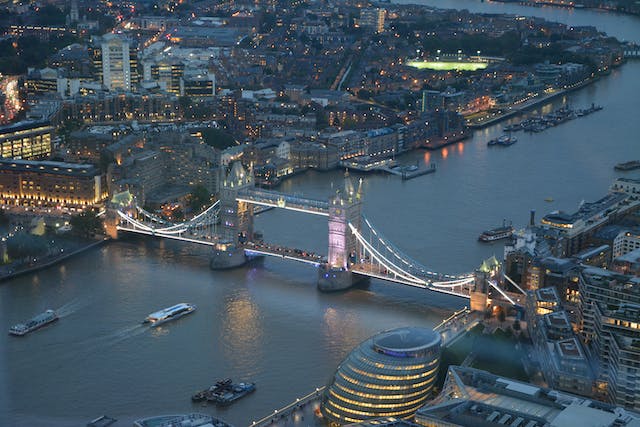Is London a good place to live, and are you even considering moving to London? This busy capital of the United Kingdom is known for its history, culture and dynamic lifestyle. But what is it like to live in London? In this section, we’ll explore the different aspects of living in London to help you decide if it’s the right place for you.
Moving and living in London brings several advantages:
- Cultural Diversity: One of London’s greatest strengths is its diversity. Here, you will find people from all over the world, bringing with them different languages, cuisines and traditions. It is a city where each district has its own unique character.
- Career Opportunities: As a global financial and business hub, London offers vast career opportunities in various sectors such as finance, technology, media and the arts. This makes London an attractive destination for professionals looking for growth and advancement.
- Education: The city boasts some of the world’s best universities and schools that offer excellent educational opportunities. (such as Imperial College London, University College London, King’s College London, etc) Whether it’s academic research, higher education or quality schooling for children, London is a prime location.
Is London a good place to live when it comes to education – Absolutely YES!
- Public Transportation: London’s extensive public transport system, including the Tube, buses and trains, makes commuting relatively easy. It is well-connected, which reduces the need for a personal vehicle.

- Healthcare: Residents have access to the National Health Service (NHS), which provides comprehensive health services, often free at the point of use.
- Cultural and Historical Sites: Living in London means easy access to world-class museums (many are free-entry museums), historic sites, theatres and art galleries. It is a city saturated in history with endless cultural experiences.
- Food and Cuisine: The city’s diverse population creates a vibrant culinary scene. From street food to Michelin-starred restaurants, London caters for all tastes and preferences.
- Parks and Green Spaces: Despite being a busy metropolis, London has beautiful parks and green spaces like Hyde Park, Regents Park and Hampstead Heath, which provide residents with a much-needed escape from urban life.
- Networking Opportunities: London’s status as an international city means you can build a diverse network of contacts, useful for both personal and professional development.
- Entertainment and Nightlife: The city is rich with entertainment, including clubs, bars, live music, theatre and more, catering to all interests and lifestyles.
You may also like:
Travel back into the ancient civilizations: Egypt, Rome, Mayan civilization, Inca civilization
Life in London, like in any big city, also has its disadvantages:
- High Cost of Living: One of the most significant disadvantages is the cost of living, which is one of the highest in the world. In particular, housing can be very costly, whether you rent or buy it. This disadvantage can be a crucial answer to the question is London a good place to live when it comes to choosing and living in a city on a more affordable lifestyle.
- Busy and Crowded: London can be extremely busy and crowded as a major world city. This can be devastating, especially in areas with many tourists and during peak times on public transport.
- Weather: British weather is notoriously unpredictable and often leans towards grey and rain, especially in the winter months. This can be a significant adjustment for those used to sunny climates.
- Pollution and Air Quality: Urban pollution is a problem in London, with air quality often poor, which can affect health and overall quality of life.
- Noise and Light Pollution: The constant buzz of a big city means that noise and light pollution can be problems, especially in central areas, affecting sleep and relaxation.
- Small Living Spaces: Due to the high cost of real estate, living spaces in London are often tinier compared to other cities or rural areas, which can be a challenge, especially for families.
- Long Commutes: Although public transportation is extensive, travel times can be long, especially for those living in more accessible areas on the city’s outskirts.
- Competitive Job Market: Although there are many career opportunities, the job market can be very competitive, with high expectations and demands from employers.
- Social Isolation: In such a fast-paced environment, it can sometimes be challenging to build a real meaningful social network, leading to feelings of isolation, especially for newcomers.
- Healthcare Pressure: While the NHS provides healthcare, the system can be under pressure due to long waiting times for certain treatments and services.
Here is some useful content you might be interested in:
Travel Essentials for Men: Packing Smart for Effortless Travel
The cost of living in London varies greatly depending on your lifestyle, choice of accommodation and personal needs. However, here is a quick overview of some typical costs that can answer your question if London is a good place to live:
- Housing: This is usually the most significant expense. Rent can vary from around £700 to over £2,000 per month, depending on size and location. Central London is much more expensive compared to the outskirts.
- Utilities: Monthly utility bills (including electricity, heating, cooling, water and garbage) for a standard 85m² flat can be around £150-£200.
- Transportation: A monthly ticket for public transport in zones 1-2 is around £138. If you live further away, that cost increases.
- Food and Groceries: Average monthly grocery bills can range from £150 to £300 per person, depending on eating habits and where you shop. Eating out regularly will increase your food costs significantly.
- Healthcare: Although the NHS is publicly funded, there may be additional costs for dental and certain medical services. Private healthcare is more expensive.
- Entertainment and Leisure: Costs vary widely, but tickets to movies, restaurants, and other activities can add up. Expect to spend £50-£100 per outing.
- Clothing and Miscellaneous: Depends on personal preferences and needs, but can be more in a fashion-forward city like London.
- Internet and Mobile Phone: Expect to spend around £30-£50 per month.
- Insurance: There will be additional costs if you need personal insurance, such as car or other health insurance.

For a single person, the average monthly cost (excluding rent) can be around £750-£1,200, while the average monthly cost of a family of four (excluding rent) can range from £2,500 to £4,000 or more.
It is important to remember that these figures are approximate and can vary widely. London offers a range of lifestyles, and living costs can be managed with careful budgeting and lifestyle choices.
Life in London offers a combination of cultural richness, professional development and endless fun. Although it comes with a high cost of living and busy city life, its vibrancy and opportunities are well worth it. So the answer to the question, is London a good place to live? – YES, London could be the perfect place for you if you’re looking for an urban lifestyle in a city packed with history and diversity.





Leave a reply